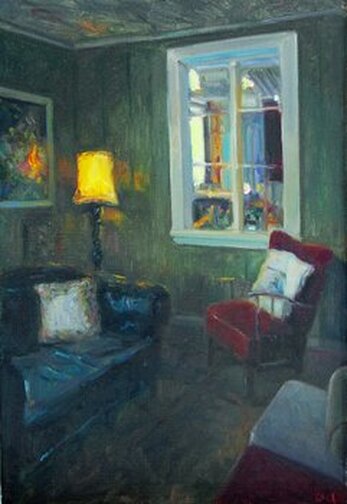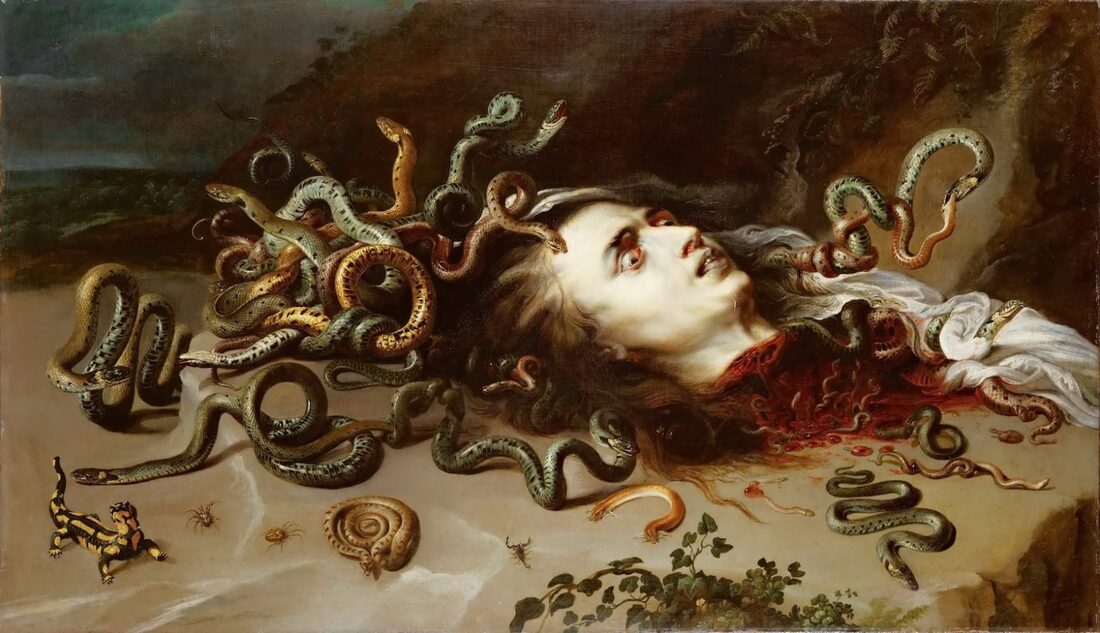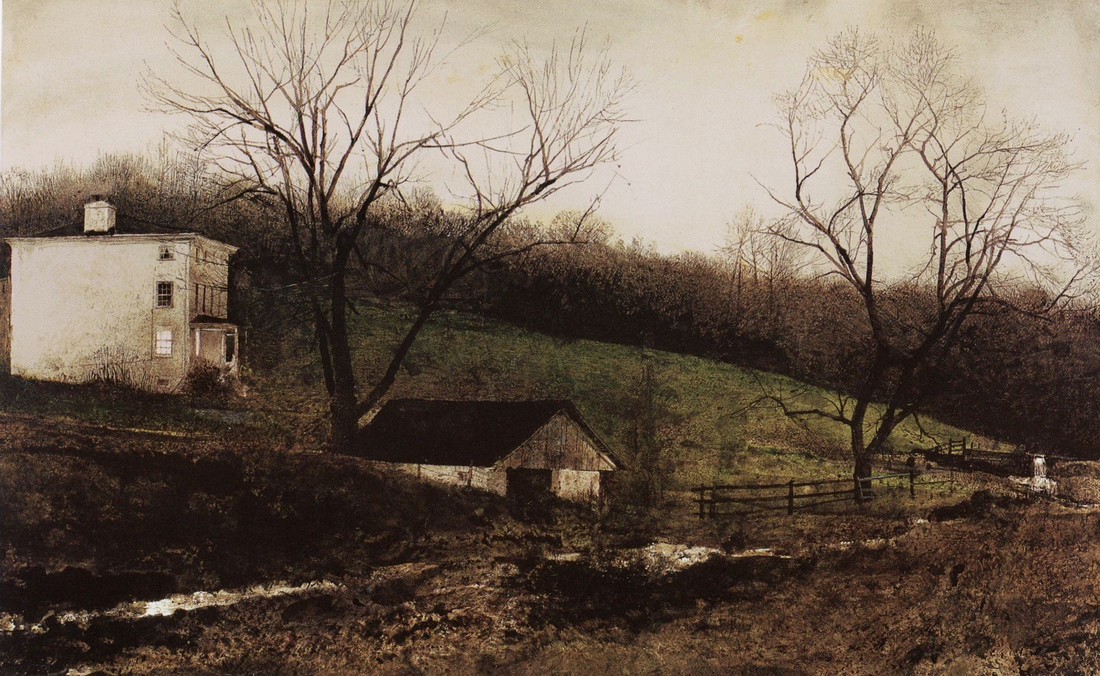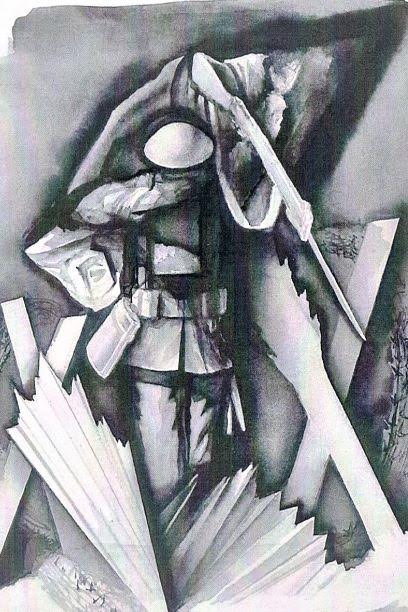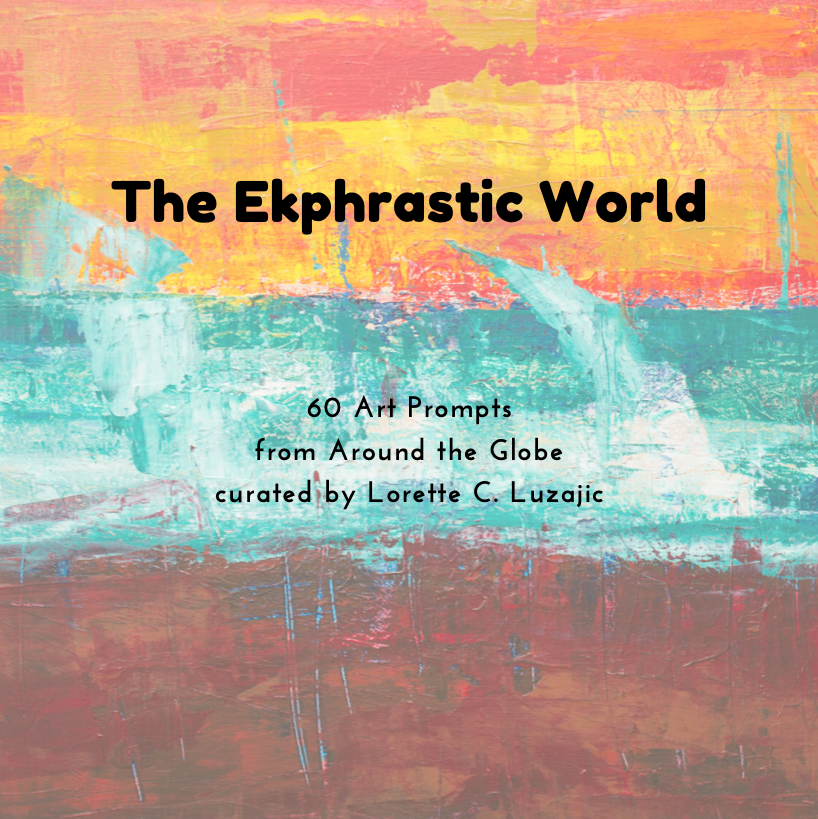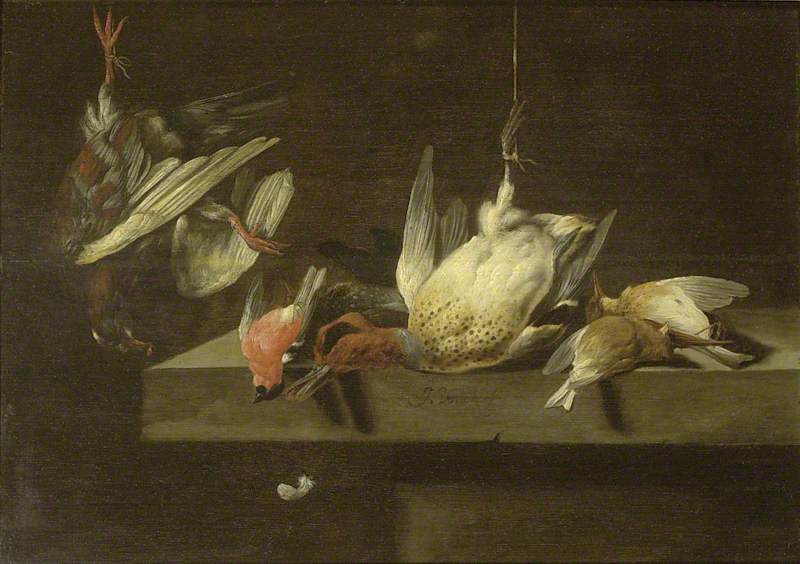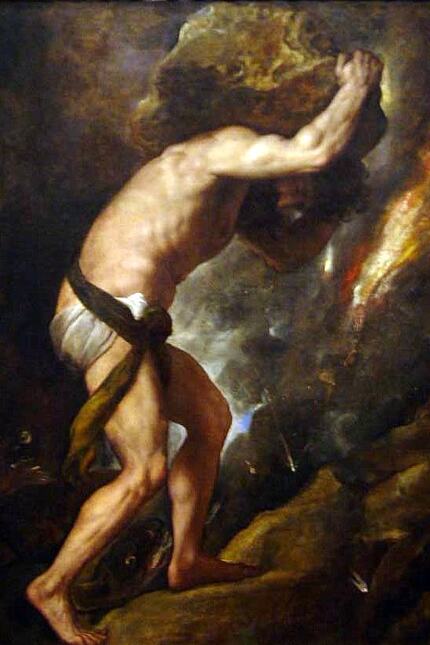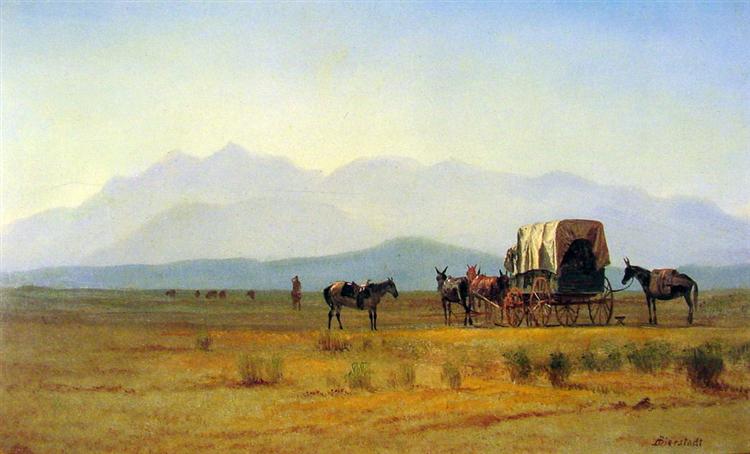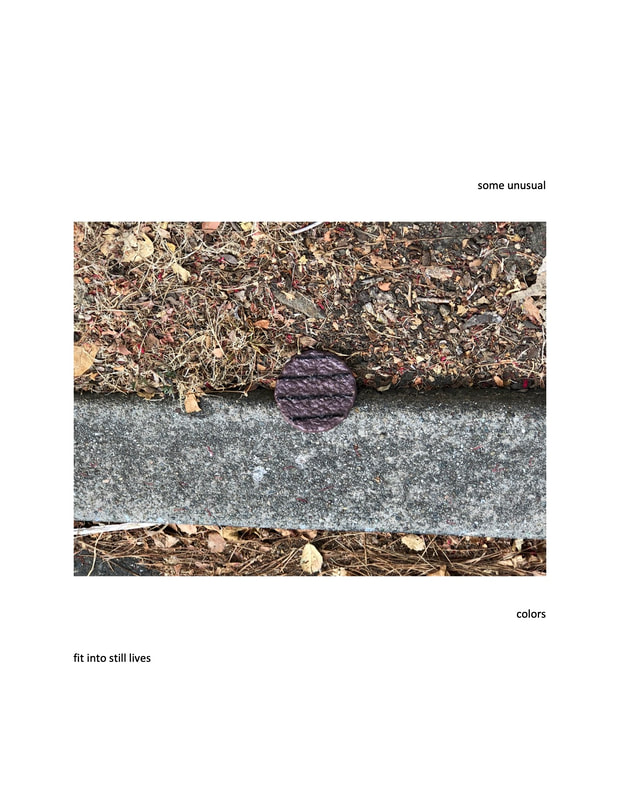|
A Conversation between Winners of the Scugog Arts Council Ekphrastic Writing Competition: Eleni Gouliaras (Poetry) and Tristan Marajh (Fiction) written by Tristan Marajh A series of coincidences led Eleni Gouliaras and myself to discuss ekphrastic writing and our recent Win in the 2020 Ekphrastic Writing Competition from The Scugog Arts’ Council in Ontario, Canada. The first coincidence, evidently, is our win: we were both awarded 2nd Place in our chosen genres: Eleni in Poetry (Adult), and I in Fiction (Adult). The second coincidence is that not only are we co-winners but co-workers: we both work at The Markham Public Library, a system neighbouring Toronto’s. That we met up in the latter city’s Greektown to have this conversation is the final coincidence – Ekphrasis being Greek for “description.” Over a meal and drinks, we caught up with each other’s lives, discussed our winning pieces as well as writing itself – both Ekphrastic and otherwise. Ladies first the saying goes, and so Eleni graciously asked first about the young lady of my piece, Min-Ju Kim – protagonist of The Complete Works of Min-Ju Kim. EG: What inspired the character of Min-Ju? TM: Some of Min-Ju’s challenges, like challenges of characters conceived from many authors, echoes a personal experience of mine. And like those authors, I did not wish to make her evidently myself, since there are parts of the tale that necessitate fiction. EG: I found that Min-Ju’s inner thoughts transform Erin LePage’s seemingly-unassuming print of a girl sleeping on a couch into an exploration of mental health. TM: Such a tableau is common in a depressive person also: lying down curled and covered up, avoiding eating, avoiding the world. Having set the scene for Min-Ju’s background of depression, I was able to expand on her breakthrough through it. She endured that pain particularly acutely because in the original, longer version of The Complete Works of Min-Ju Kim, a person she loved broke up with her for cultural reasons; a situation that unfortunately happens frequently in Toronto and in a place and time where it needn’t. EG: Are most of your stories character-driven, then? TM: I would say most of them are message-driven; or, at least, philosophically driven. Characters of course remain crucial, though: a well-constructed character can help drive those perspectives home. EG: The idea of Presence is very important in the story. How does Min-Ju, as reflected in Erin LePage’s Pizza Box, show a lack of Presence? TM: In short, because the Min-Ju in the image is depressed. Initially she displays all the symptoms of a depressed person: dark, discouraged, debilitating thoughts and a loss of appetite because of that. If one is completely identified with those symptoms as Min-Ju initially was, then one can’t claim to be Present. One can, though, claim to be Present even while depressed, because then it is more of a witnessing thing: I’m sad about this; I’m feeling this way. The recognition of that pain is a crucial part of Presence, in that I am the Person who is feeling “this”. Depression doesn’t characterize Presence, but it often is a catalyst for Presence. EG: That was actually personally helpful as well, so thank you. TM: Onto your winning poem, Silence... With similar unassumption as you had for Min-Ju in Erin’s sketch, I thought Charles Choi’s Red Chair was a not-negative depiction of quietude and tranquility in a well-considered space. I realize the sentiments in your poem are not so. EG: Silence views Red Chair through loneliness and isolation: sitting alone in a room, watching the arrivals and departures of people. TM: And then the poem takes a turn into referring to the dissolution of a relationship. EG: The entire poem, coupled with Charles’ painting, was intended to reflect on the relationship as a house that was built; including the time, effort and energy placed into building that relationship. TM: I get it; people view relationships as a dynamic mutually built together. EG: And despite that, a relationship can end: the descriptions of splintered wood and shattered glass. TM: You’ve hosted and performed at events in Toronto; your work has also won the recent Power of the Poets contest (another Ekphrastic venture) hosted by The Power Plant and the Toronto International Festival of Authors. Another poem of yours, upcoming in Feel Ways: A Scarborough Anthology, is a meditation on your time working at No Frills. Does Toronto inform your work and how? EG: Yes, for sure. I also write about natural and iconic scenes in the city: the Humber River and the Gardiner Expressway, for example. Being connected to the local writing scene here, for example at Art Bar, allows me to keep up with events and acquire valuable feedback from Toronto writers. I would also love to see poetry featured at Nuit Blanche, and in a grand spirit of ekphrasis be accompanied by the other forms of art at that event. TM: I hear that. It would be nice if forms of more “obvious” art could accompany written pieces at events like that. EG: I think that speaks to the real value of Ekphrastic writing: I reached out to Red Chair artist Charles Choi, told him my poem complemented his painting and shared Silence with him. Art-creation can be a lonely world, and Ekphrasis allows one, allowed me, to build community in that world. TM: I agree Ekphrasis is beneficial to artists across all forms: visual artists, writers, poets, performers, musicians… we can all contribute to one unified collaboration from an initial standalone piece in a standalone genre. There is a lot of potentiality there. Thanks for the talk. EG: Thank you, too. Read all of the winning entries here. Click here and scroll down to see the artwork that inspired Tristan's winning story.scugogarts.ca/news/literary-contest-winners/ Tristan Marajh is the 1st-Prize winner of the Stratford Writing Competition and a recent Winner in the Scugog Arts Council Ekphrastic Writing Competition, both based in Canada. His work has been published in The New Quarterly, The Nashwaak Review, Existere: A Journal of Art & Literature, Ricepaper Magazine, Solstice: A Magazine of Diverse Voices and down river road, a print journal out of Kenya. With a childhood spent in Trinidad and Tobago, he resides in Toronto. Eleni Gouliaras is a Scarborough poet who studied Creative Writing and History at York University and graduated in 2012. She was long listed for the 2019 Vallum Award for Poetry and was a winner for the 2020 Power of the Poets contest co-presented by The Power Plant and the Toronto International Festival of Authors. She has a poem forthcoming in Feel Ways: A Scarborough Anthology, to be released in March 2021.
0 Comments
To Ruben's Medusa Were you as myth for men the means of justifying vented spleens condemning women all to be the seed of male misogyny as both the beauty and its beast that must be slain or tamed at least by violence of word and deed ignoring higher moral heed decrying such unbridled lust as hatred sown to reap mistrust? And are you here in timeless art now mocked still more as torn apart to prove the power men alone posessed to render soul as stone? Portly Bard Portly Bard: Old man. Ekphrastic fan. Prefers to craft with sole intent of verse becoming complement... ...and by such homage being lent... ideally also compliment. ** Studying the Monster How we squander our hours of pain. Rilke, The Duino Elegies (translation by Stephen Mitchell) The monster’s eyes still roll and flare at the vision of her own murder, mirrored in the hero’s shield. Her death she distills to a love potion, holds the painter bewitched: spider, scorpion, blood turned to worms. The snakes, though sisters, devour each other. Can you hear the hiss of their scales? They should be long dead. Yet the painter cannot give them up. He cherishes the salamander’s decorative slime, the precision of fang sunk into cold skin. Most of all he loves the gloss of light on each embellished scale, sheathing over supple muscle. He has studied snakes. And why not? It’s someone’s business to learn what the hero ruined, to understand what the monster knew, and was. Laura Levenson Laura Levenson is a psychotherapist of more than forty years with a practice in Bangor, Maine. ** Medusa Does beauty or horror Turn men to stone? I think beauty – I know even I have desexed a man Made him, I tell you, Made him weep. But my strange sister Chooses horror - it is more direct Less prone to the airy art of love – Or poetry. She sits, poor sister, In a pool of blood. Her snakelets writhing Cradling her pale face Little ringlets of serpent around Her own head Resting in a nest of adders. Don’t pity her victims. There’s a relief that comes From being turned to stone – The horror deflected The worst over and done with. It seems a small price To pay for peace. To wear her tiara of reptiles Like impatient wedding guests Guarding the gates of love. Lucie Payne Lucie is a retired librarian. After encouraging others to write for the past 25 years she is taking up the reins of her own creativity once again and writing in and around London. ** Medusa Dances to Beyoncé From my blood coral sprung in the Red Sea, but Sirens never have sung about that. Break it down, River of Mnemosyne. Sing of Sarpedon where I slayed each rat, and from my pain conceived a winged horse. Cut me loose. Let the truth of me be told. Haters lie because they’re jealous of course. My body rocks while theirs are just stone cold. Their mythological beast - I’m not her. I am not broke, not crying, and not dead. Threatened by my swag and by my power, they call me crazy. Claim I lost my head. O' say that to my face! But they won’t dare. Go and find Athena with the good hair. Emily Abedon A recipient of the 2013 Beatrice Ravenel Prize from the Poetry Society of South Carolina, Emily Abedon is an advocacy journalist, and a member of Charleston’s Long Table Poets. Her writing has appeared in numerous national and regional publications, as well as in the book, Ripple Effect: Water Stories. ** Visiting Hour, Gothel Towers My brush! Mother shrieks among high-register howls for blankets, juice, a hand on the cheek. Her gnarled hands paw empty air, proving the brush’s absence, reason enough to rebuke. I find it on the rumpled spread she brought from home, spin back to a time when she remembered my name, when I teetered on a footstool to finger her storied mane, its cascade. How it heightened her heron’s silhouette, the way she tilted towards mirrors. Her thorny cough returns me to the briar of her hair. I first pass the bristles over my scalp, try to subdue some primal itch. Her reproach familiar — Your hair’s a mess. Stinging, like her old wooden brush hard on my backside. Mikki Aronoff Mikki Aronoff’s work has appeared in The Lake, EastLit, Virga, Bearing the Mask: Southwest Persona Poems, Love’s Executive Order, bosque9, Intima: A Journal of Narrative Medicine, SurVision, The Ekphrastic Review, London Reader, Popshot Quarterly, and elsewhere. A New Mexico poet and Pushcart nominee, she is also involved in animal advocacy. ** Before Perseus That clever, god-sponsored boy, With his mirror shield And sharp sword, Came to cheat her of her prey And put an end to her, Medusa was lonely. Even as her crown of snakes Flickered their tongues To taste the air For any new intrusion, Curling and twisting In a sinuous mass, Making a wild corona Around the angry eclipse Of her face, She waited in her field of bones For the one who would come Somehow alone Able to look at her And live beyond the moment Of her gaze Mary McCarthy Mary McCarthy finds ekphrastic writing a wonderful way to engage and connect two favourites—visual and verbal arts. The more she develops this practice, the more irresistible it becomes. ** Ruben's Medusa The hatred burning in her eyes Those eyes — my God! Those awful eyes That Hellish glare — My God! The horror oozing from her head Created serpents— never dead -- The hatred burning in her eyes Those awful eyes — my God! Joan Dobbie Joan Dobbie co-hosts the River Road Reading Series (RRRS) held on the last Sunday of every month May-Sept now of course on Zoom. Her latest book, The Language of Stone (uttered Chaos Press) came out in October 2019. Her poem "When Your Man's a Drunk" took 1st place in the Oregon Poetry Association's 2020 Spring contest Traditional Form Category. She has a 1988 MFA in Creative Writing from the University of Oregon. ** Medusa Burnt red by hate and wide. Once resplendent Phorcy’s pride. Swept down by Neptune’s trident, and left, bereft, in a dark hideout. Face alive, sip serpent eyed, spirit tarred, brushed with lies; Underworld her home, over feared, a saviour sought to spike her spear. Writhing mane of bitter fangs, taste of mouth and bloody tang. Forlorn and shaken, horror stare, beaten crimson to a hunter’s lair. Food and thought and poison, one look and lives are frozen. Cursed by the gods who love, Embittered, battered, halved. Rolled away from reptile frame, head encased for Perseus fame, a hero rescues a forgotten princess. Medusa caught in Neptune's disgrace; and sent to die a monster’s death. Bitter gods, not mercy; stinking breath. Worship falsehood, worship man. Her eyes wide; your heart a stone. Zac Thraves Zac Thraves lives in Kent, UK and writes for pleasure as much as for a living. He has created an online course using the arts to overcome anxiety and depression and has written a book about his own struggles. All his books are available on Amazon. Poetry is a passion, and most of his poems are safely kept hidden away; this wonderful website offers an opportunity to share his work with others. Zac appreciates the works of Percy Bysshe Shelley, H.R. Hays, Steven Spielberg and Vic Reeves. He plays guitar, badly. ** Self-Portrait as a Lovesick Goddess My eyes can ignite small objects. The smoke reveals maps to all my beloved’s islands. I study an atlas of rivers. Each will tell me one of my beloved’s secret names. Do not fret over the roiling brew of my troubled teapot. Every heart contains this venom. See bracts upon my honey head dreaming of my love’s ambrosia lips. I shed my clothing like old skin to be new. I stare at thorns. Wear them as crowns. My ear I press to the ground to listen as roots clutch rocks, tell my beloved’s dreams. Coded in my memory is a secret passage to my beloved’s inner room, the one with no door. I shall not let death stop me. My severed head can still strike, fangs dripping love. Kit Loney Kit Loney comes to poetry from a background in visual art. Her poems have appeared in New Verse News, Prime Number Magazine, The Ekphrastic Review, Fall Lines, Emrys Journal, Kakalak, Yemassee, Qarrtsiluni, Waccamaw, One, Poetry East, and others. In 2012 she received the Carrie McCray Nickens Poetry Fellowship from the SC Academy of Authors. ** Rest Because it is Friday, again Friday, my daughter will stagger home after standing on pins, on eggshells, on tip toe to teach her students how to trill their throats into notes higher and lower than what a staff allows, lips slipping and kissing the air that comes from their own young lungs that must not pass the masks they wear, where only eyes can be heard, heard hurtling toward a line, the thirty minutes they can stand far apart, far apart, the thirty minutes she draws their voices together into tones, blended for tenderness, for toughness, the tied tongues trying not to spit words into the world that traps them as it sends them out, again and again, a tune to be carried, tucked inside their looped ears, their laptop screens, a tune they can sing to when touch is lost to a tightened throat again, again, because it is Friday and she can come home, open her own taut throat, again, to keep from screaming. Mary Hutchins Harris Mary Hutchins Harris is a poet and essayist. She is an Interdisciplinary Studies faculty member in Lesley University’s MFA program in Cambridge, MA and on faculty at the Downtown Writer’s Center, Syracuse, NY. ** No Body A head without a body still wears vengeance. No Eastern brown snakes for me. Color me emerald green pit viper, boomslang, banded krait. Color me Malaysian coral snake, my neon red head and electric blue stripes inviting paralysis. A head without a body still remembers. Athena’s temple, golden white marble cold on my back, Poseidon mocking my screams. Gods and men take what they want. A head without a body still desires, how the breeze once caught my curls, swirled their silk against my cheek. Men’s longing bored into me. A head without a body still knows that rage rewards more than sorrow. They hunted me with swords and spears. They gazed on me and turned to stone-- Oh, men, you should have left me alone. Claudia Monpere Claudia Monpere's poems and fiction appear in many literary journals, including New Ohio Review, The Kenyon Review, Prairie Schooner, The Massachusetts Review, and The Bellevue Literary Review. She lives in Oakland, California, and teaches at Santa Clara University. ** Coiled Again Energy wound wound wound Held contained Bound Confined in morphed coils Hissing and venomous Forward vision trapped in a mason jar Sealed Congealed Cyclical trauma writhing on stone table Cold seeping upward into warm blood Self-consuming Serpents struggle to maintain their foothold but It’s time for someone new to devour As their symbolism Their identification Their stamp of victimhood Needs another woman To defile And define Melinda Dewsbury Melinda grew up in rural Bruce Township, Ontario, where she lived as a farm girl and spent much of her time in contemplation. She now lives in Langley, B.C. and teaches at Trinity Western University. She is a poet and previous contributor to The Ekphrastic Review. Her work tends to draw on spiritual inspiration, nature, allusions to biblical, historical, and mythological narratives, and the human condition, especially human experiences of trauma. ** #Medusatoo Athena! cursing me wasn't enough? all because I was born beautiful you're the goddess no one asked you to notice me what is your mal- function & OMG you have to send a man to fight your fight he comes for me in my sleep really girl please! Perseus! a hero? bullshit what a dickless coward afraid of me in my waking state look at me! I'm all eyes c'mon I still got it I will marbleize you it's the least I can do you immortalized me look goddamn you! #whatareyoulookingat #youdontknowme #medusa4ever JD Robertson JD Robertson is a teacher, artist, writer from Kermit, Texas residing in NYC. ** Severed The last petal plucked from my thought bouquet of us says you love me not, provoking the fist of stems left behind to writhe and come alive as fork-tongued and hungry snakes. They consume the parts of me that are not you and breed in the parts that are. Dislocating their jaws, forcing themselves over ipseity like it’s a flimsy mouse. Curiosities and thoughts gormandized until the serpents must retch to repeat. My skull cracks with ophidian desire. My scalp is alive with snakes, each of them a different colour of you and hissing. Severed, my head thuds to the floor. The snakes cannibalize because they’re all that’s left of me. The snakes tangle because they’re all that’s left of me. They bleed from me. They’re all I have to bleed. It would petrify you to see me this way, to know you can do this to me, but you’ve become a stone fixed in time and a memory, and I can almost feel grateful. Briana McCormack Briana McCormack is from Raleigh, NC and is previously unpublished. Having just turned 25, she now writes snake poems in an attempt to launch a writing career. Welcome to her quarter-life crisis. ** #Medusa In the morning your dress and underwear had your fingers on them In the night your dress and underwear have his fingers in them Your head feels detached from your body as you watch his fingers turn into snakes yessss yessss yessss as you realise the snakes are now yours to keep like your useless dress and underwear Tricia Marcella Cimera Tricia Marcella Cimera is a Midwestern poet with a worldview. Her work is found in many diverse places online and in print, ranging from the Buddhist Poetry Review to The Ekphrastic Review. Her micro-chapbook entitled GO SLOW, LEONARD COHEN, was recently released through the Origami Poems Project. One of her poems is pleased to have earned a Pushcart Prize nomination, another is happy to have received a recent Best of the Net nomination. Tricia lives with her husband and family of cats in Illinois, in a town called St. Charles, by a river named Fox, with a Poetry Box (also named Fox) in her front yard. ** Venomous Toxic, her bite - malevolent, her strike, serpent strands outstretched like arms, reaching, reaching deadly invitation beseeching. Unwary vessels follow his course Poseidon, of course was to blame, Medusa, the beauty was his to claim from the temple but her fate was doom; Athena’s ire was complete, the stupidity of seduction caused Medusa’s viridity, snakes replaced long flowing hair. Destined Gorgo to guard passage hence, no chance to offer to Athena her penance; vicious anger erupted in the temple, until the day when her head, a blade did sever, fearless captain’s trophy, alas his clever action silenced Athena’s deadly wrath. Medusa’s look of startlement, features frozen, with lethal finality, Athena’s spell was broken. Julie A. Dickson Julie A. Dickson is a NH Poet whose work has appeared in Poetry Quarterly, Poets' Touchstone, The Avocet, Blue Heron Review and Ekphrastic Review, among others. Her full length works can be found on Amazon. Dickson advocates for captive elephants and has two rescued feral cats. She is on the board of the Poetry Society of NH. ** Your Shame Reincarnated Your slippery mistress has found her history, discarded Horror has a place where wisdom cannot slither All that is left is your shame reincarnated, in carnage Neptune will not pray to slumber innocent and unguarded Her wrath like serpentine tongues she scissures Your slippery mistress has found her history, discarded She kills on behalf of her hope, the taken and pardoned Of the murder, her glance like glass to pay a tither All that is left is your shame reincarnated, in carnage Worn of dawnshield use and other violators thwarted On someone else’s front and center, she withers Your slippery mistress has found her history, discarded Tongue out and rough like unspoken dark turbided Crawling from the neck, guilty of an afterdeath sinner All that is left is your shame reincarnated, in carnage Her white eyed weapon of disgust looked over, disregarded She accuses and lives on to pass on death without fissure Your slippery mistress has found her history, discarded All that is left is your shame reincarnated, in carnage Andie Sheridan Andie Sheridan is a senior student at Pomona College, double majoring in Religious Studies and English. They are interested in rewriting ancient Greek figures in search of an alternate future-oriented mythmaking. ** Medusa’s Twenty-First-Century Reflections “[Writing] will give her back her goods, her pleasures, her organs, her immense bodily territories which have been kept under seal." — “The Laugh of the Medusa,” Hélène Cixous Oh, Rubens, please. Enough with the snakes. You carried yourself away painting them, obsessed with their sensuousness, ominous coloring and coils. Yes, they are a tribute to your talent as a painter. They could crawl right off the canvas and fill an Indiana Jones snake pit. And don’t get me started on how my name was given to the deceptive genus of snaky-tentacled jellyfish. I wasn’t pleased to be made a Gorgon, you know, to have two sisters with the same undesired hair, to have a look that turned men into stone. A woman wants to look her best, but mythology can be so maligning. Take a look at what my name means in Greek: guardian, protectress. Nothing here to explain why I was branded dangerous or evil. Athena punished me, the woman, for Poseidon’s rape in her temple. As though I asked for that transgression. Nothing’s really changed over the centuries. It’s always the woman’s fault. Sandi Stromberg Sandi Stromberg recently won Top Honors in the Friendswood Public Library Fourth Annual Ekphrastic Reading and Contest for three poems that originally appeared here in The Ekphrastic Review.Other publications include Purifying Wind, Snapdragon: The Journal of Art and Healing, formidable woman sanctuary, and the 2021 Texas Poetry Calendar. ** Medusa in Our Times Her eyebrows question -- tongue protrudes. This is definitely not standard procedure for heroic head-lops. We are not in the OT any more — not with David / Goliath Judith / Holofernes. Usually, all eyes are on the hero / heroine as he / she holds a head aloft to prove a point. But here in Rubens’ study, the snakes escape -- and roiling, coiling -- abandon ship -- every snake for itself. One neatly coils. One wriggles away towards a dark cliff-edge. One swallows another while smaller stingers (scorpions and spiders) are cast adrift — near cliff-drop black oblivion. And one who’s grown legs -- a lizard now — looks straight at me, as if to say, “Can you believe?” And I, caught here, too, on / at this edge of anarchy and sheer incompetence -- between devil and deep dark sea — say, “Yes.” Helen Brandenburg Helen Brandenburg's poems have won The Poetry Society of SC’s most prestigious award and have appeared in Best American Poetry blog as well as such journals as Pirene’s Fountain. A former ballet dancer, teacher, and director, she was also a long-time English teacher and has read at Piccolo Sundown Poetry. Presently, she is one of Richard Garcia’s Long Table poets in Charleston, SC. ** Release the Charm “On Herod’s birthday the daughter of Herodias danced . . . .” --Matt 14:6 Oh my, how I danced. The eyes of every noble and dignitary fastened on my skirts, snake-bitten. I needed no music. My mission was clear: whirl until a silk or two dropped at the sandals of each one in the palace. Not mother of course, though her smile was greatest. Her eyes blazed and reminded me to snug my boa. Rhythmic cheers. Rattled dishes. One pile of moist frenzy heaped in the center of the marble floor. A brood of asps. I rested. Hissed. Heard the request. From my own mouth, His head. His head. Todd Sukany Todd Sukany, a Pushcart nominee, lives in Pleasant Hope, Missouri, with his wife of over 37 years. His work recently appears in The Christian Century and Fireflies’ Light. A native of Michigan, Sukany stays busy running, playing music, and caring for four rescue dogs, a kitten, and one old-lady cat. ** Portrait of Medusa I can say nothing about her. Nothing about the fear, eyelids Pink as the carnations she once Wove through her hair, when She still had it. Nothing about the Snakes with which Minerva Punished her when, one fine Afternoon, Neptune raped her In the temple. Nothing about The blood leaking, and the snakes Inside the blood, and the terror Of a face eternally preserved by Rubens who came after Ovid, Rubens who liked the story and Christened it again so mothers Could show daughters and say: this. Do not do this. Sophia Chanin Sophia Chanin is the recipient of the American Jewish Historical Society’s Emma Lazarus Poetry Award. She studies English at Pomona College. ** Meddling Medusa My disembodied beauty, How dare you lose your mind over peripatetic matters. What are those thoughts, Slithering around your head Demanding your attention? Entanglements, bloodied arguments? Dirty minded murmurings? Convinced and committed Thoughts of destruction and confusion? Lose your head if you must And surround yourself with the detritus of life. But remember, Your salvation yields no reprieve. Die into darkness, My disembodied beauty. Ellie Klaus Ellie Klaus was born and raised in Montreal. She has lived different selves over several decades: daughter, wildlife biology graduate, vision quest traveler, family life educator, president (of her son's school committee), friend, confidante, lover, wife, mother, caregiver and now caregivee, if there is such a word. Each has contributed to a different perspective of living, of life. The pieces of the puzzle are evident and coming together, although the final image is yet to be revealed. So, writing has reemerged as a creative endeavor to release some of the angst that arises from living a confined life, or any life for that matter. She has a poem entitled 'Bones' that appears on NationalPoetryMonth.ca April 9, 2020 and poems published in The Ekphrastic Review. ** The Head Perseus stumbles in the night static, drags his sword through scarred earth. Through paths of stone statues with buried feet, he weaves and weaves. Their heads and neck tendons contort, jaws still unbroken, they flash eternal teeth. Perseus flinches at a cracked branch, scours the brush, imagines impossible movement, but there is destruction in his name, so he starts again. The cavern of the sky comes down. A fire on the island has made the winds heavy with crimson, splinter of night sets in. The past and its way of never letting go. The hills that thrash and close. Perseus falls into their pitch-black, eager and beating, drawn clean to the Gorgons’ den and the halos of their neatly-folded wings. His wide eyes adjust to the cavity in the split earth, still raw from the tossing ocean. Down the deep he slinks, murder tight at his toes. Medusa slips out of the long sleep, the slow unsheathing of her eyes. Perseus feels nothing as his sword flies, blind to the adamantine struggling, he thinks only of the rain that birthed him, its golden slits come down. Her mouth, waning, no words only Pegasus now, springing from the newly dead, wide-eyed and shaking. The head falls, heavy with shame. He pushes through to the gaping wide-open outside of the cave-- the hole that the gone head makes, yawning in the raw night. Perseus takes his prize, bears it over seas, brandishes it like a trophy. He is newly golden, beaming in the endless day. Everything is mostly okay. The sky unhatches into his palms, catches the whites of the head’s eyes, the thin lines of blood vessels snake their way toward the center black. And finally, at last, no one looks away. Hannah Radeke Hannah Radeke is a poet and photographer living in Chicago. They studied art history and creative writing in undergrad. ** Growing Medusas in the Desert Covered in freckles Writing in snakes to avoid thoughts and you Wished to face the sun Toeing the streams to skirt traffic but you There is a god on each side Past - present - beauty Caress the current There is a myth on either side Daybreak - coral earth Grow them jellyfish Think of a then to avoid trouble to air the rage I've never showed you but might do soon once the red mountains loom down and my strands stop shooting stone Kate Copeland Kate Copeland started reading libraries at the age of five. Her love for words led her to teaching and translating her three dearest languages, while singing along to her favourite lyrics. Her writing teacher advised her to skip stories and start poetry. The subsequent writing waves have already resulted in some publications...leaving a crave for more! She was born in Rotterdam some 51 years ago and adores housesitting in The United Kingdom and Spain. ** Medusa I used to love my golden hair: you always wanted to touch it, and when you looked you into my eyes, you wanted to keep looking. That was before the monster reeking of dead fish and seaweed pinned me down on the purple tiles of the floor of Athena’s temple, which made her so mad she turned my hair into serpents as if it was my fault, as if I could have gotten out from under the ruler of the sea, who raped goddesses, queens. princesses, his own sister, his granddaughter, anyone he wanted to. Now you can no longer caress my hair. He is still and always in my eyes, which would petrify you if you looked into them now. Ed Gold Ed has a chapbook, Owl, and poems in the Ekphrastic Review, New Verse News, Passager, Think, New York Quarterly, Kakalak, Window Cat Press, Kansas Quarterly, Cyclamens and Swords, Poet Lore, Rat’s Ass Review, Homonym Journal, and many others. For 15 years, he taught at the University of Maryland and now is a writer, editor, and writing trainer for various government agencies and large corporations. For the Poetry Society of South Carolina, he runs the Skylark contest for high school poets. Ed lives in Charleston with his wife, Amy Robinson, and their terrier, Edie. Evening at Kuerners after Wyeth twilight claims the day the ice mountain stream flows more quietly as it passes the house bird cries settle silently on barren branches and the wind blows a little colder within the wood realm night creatures open eyes watching the pale sky turn dark and secure a stray twig taps softly against the shed window and slender weeds tentatively caress the sides of the house as all colour disappears no smoke rises from the chimney and within the house there is but a single light E. D. Lloyd-Kimbrel This poem first appeared in Foxtail, and was reprinted in Dan River Anthology. In one way or another, E. D. Lloyd-Kimbrel has been writing since childhood, with poetry a constant. Over the years, here and there, off and on, in-between various employments and academic endeavors and geographical locations, she has published creative non-fiction, biographical, critical, and scholarly articles and essays in peer-reviewed publications, and a scattering of poems in little literary journals. Dear Readers and Writers,
Some of you have written to note that like buttons aren't functioning properly. They may read zero one moment and something else the next, or have different tallies in Chrome, Safari, Android, etc. This is a platform wide engineering issue behind the scenes, not just at our site. They are working on it. Please continue to "like" work you like in hopes that this will be corrected soon. We apologize for any inconvenience and hope this is all cleared up soon! Thanks for reading and writing ekphrastic! Lorette Study for a WW1 War Memorial He shelters his eyes from the explosion, or is it to swipe away tears, as dead-weight his comrade falls onto his shoulder. It was a necessary war, but some would argue that it was badly led by those far away from the suffering and dusty deaths of the Pals from northern towns, neighbours even, from streets and avenues that will party beneath the bunting and the waving of flags, when victory day finally comes. By Christmas, so they say. Doug Sandle Doug Sandle is a retired psychologist and university academic. A Manxman, he came to study at Leeds in the 1960s, founding and editing several arts and poetry publications. His then contribution to Leeds Poetry is acknowledged in the Poetry Archive website of Leeds University Library’s Special Poetry Collection. He had been published intermittently over the years, including sharing a poetry page with Harold Pinter. More recently his poetry has appeared twice in The New European and in an anthology of poetry, The View from Olympia on Olympic sports. He also writes plays and short stories. If you've already got your ebook copy of The Ekphrastic World, you've been busy writing for awhile! This big book of art prompts from around the globe is a great asset to your ekphrastic practice. It is also a fundraiser for your favourite literary journal, so thank you for your support! The deadline for the ebook anthology is November 1, 2020. Send submissions to [email protected] with ANTHOLOGY SUBMISSION in the subject line. Your purchase qualifies you to enter up to 15 poems or 5 stories from the prompts inside. There is still time to get creative! You can also pick up the ebook Fifty Ekphrastic Approaches, which contains fifty different ways to create an ekphrastic poem or story. THANK YOU for your support and we look forward to reading your poetry, prose and fiction! Lorette The Ekphrastic World: 60 Art Prompts From Around the Globe
CA$20.00
The Ekphrastic World: 60 Art Prompts From Around the Globe curated by Lorette C. Luzajic This ebook was created as a fundraising initiative to celebrate five years of The Ekphrastic Review. The prompts were originally created for an anniversary anthology. Please note that the deadline for anthology has passed. However, you can still use the carefully curated selection of artworks from all over the globe for your own ekphrastic practice. Thank you for your support! Still Life The finch was draped like Dali’s clock, its head flung over the feeder’s lip and strange. Odd place to die, bathed in sunflower seeds. Not yet stiff, the body looked like a model who’d flung herself at the most uncomfortable settee, arm thrown at some impossible angle, defiantly nude, a figure of abandon on rough fabric. But for its downy neck, the bird was flecked with crimson as if the artist had lost her nerve last minute. The beak gave the death away, cocked sky-ward on one side and the other down and twisted in a weird Picasso smile, and the bird’s feet up like a cartoon character that falls after a dramatic twirl, all comedy but for the lolling head. Did a hawk drop with such force as to turn the beak, break the neck, then fly startled from its kill? What is this male habitus? This tableau, this deadly art, this malady. Elinor Ann Walker Editor's note: The poet references several artists and styles in this prose poem but the piece is not based on a specific painting. We chose this still life to show with her poem, but it was not the inspiration for the work. Elinor Ann Walker holds a Ph.D. in English from UNC-Chapel Hill and is an adjunct professor at University of Maryland Global Campus. Ann’s work appears or is forthcoming in perhappened mag, Mezzo Cammin, Better Than Starbucks, Tiny Seed Literary Journal, Whale Road Review, Rat’s Ass Review, and Black Bough Poetry, among others, and in several anthologies. She lives with her husband and three dogs, is the mother of two college-aged sons, and does her best writing outside. Her website is https://elinorannwalker.com Tea with Sisyphus Sisyphus and I had tea one gray morning at the bottom of his hill. he liked the low tang of black bergamot. (I preferred the bounce and blast of green mint.) he wore little but a business casual chiton and a bent smile. his skin stretched over his barge-blown shoulders like a canvas of sails fleshed out by ice scudding on wind. he placed his boulder in the cradle between collar and blade, that space thrumming with sweat and breath. not one muscle blenched when he picked up his sandwich and teacup with one free smooth red-brown hand. peculiar-- how he would not put that rock down in the sand, and how that bent smile siphoned a threnody of tea-flushed moans. funny-- we both chewed cleanly round the crust, but he guzzled the meat-- and left behind (at the bottom of that hill) his sandwich bones. Denise Keenaghan Denise Keenaghan is an English Literature teacher and poet originally from Austin, but currently living in Houston, Texas. Her work has been published in the St. Edward’s University literary magazine, The Sorin Oak Review (formerly The Aesthetic Voice) and in the University of St. Thomas of Houston’s Laurels literary journal. She is the recipient of the St. Edward’s University Ellen Garwood Poetry Award as an undergraduate student. She completed her MLA in Literature, and her thesis was recommended for publication. She and her husband have raised three creative and artistic sons, and she is currently working on a poetry compilation dedicated to the power of the female synesthetic voice. Surveyor's Wagon in the Rockies The lone figure fifty yards beyond wagon and resting team cocks arm to hat to shade his disbelief. How can those mountains, blue and humped as plowed earth, grow taller every day but not closer? No tripod or transit set, horizon unmarked by boulder, tree or water’s glint. How do you measure a measureless land, a land empty of everything but wind and grit? Of five mules and a saddle horse, not one drops its head to graze. Kenneth Chamlee Kenneth Chamlee is Emeritus Professor of English at Brevard College in North Carolina. His poems have appeared in The North Carolina Literary Review, Cold Mountain Review, Ekphrasis, and many others. He won ByLine Magazine's National Poetry Chapbook Competition (Absolute Faith, 1999), and the Longleaf Press Poetry Chapbook Competition (Logic of the Lost, 2001). His poems have appeared in six editions of Kakalak: An Anthology of Carolina Poets. He is currently working on a poetic biography of painter Albert Bierstadt. Learn more at www.kennethchamlee.com. Alan Bern
Retired children’s librarian Alan Bern’s poetry books: No no the saddest and Waterwalking in Berkeley, Fithian Press; greater distance, Lines & Faces, his press with artist Robert Woods, linesandfaces.com. Alan has poems, stories, and photos published in a variety of online and print publications. Alan was a runner up for Raw Art Review's “John H. Kim Memorial Short Fiction Prize” for his story 'The alleyway near the downtown library'; and he won the Littoral Press Poetry Prize in 2015. Recent photos published: unearthedesf.com/alan-bern and https://wanderlust-journal.com/2020/07/01/around-the-few-blocks-nearby/. Alan performs with dancer/choreographer Lucinda Weaver as PACES and with musicians from Composing Together, composingtogether.org. |
The Ekphrastic Review
COOKIES/PRIVACY
This site uses cookies to deliver your best navigation experience this time and next. Continuing here means you consent to cookies. Thank you. Join us on Facebook:
July 2024
|
